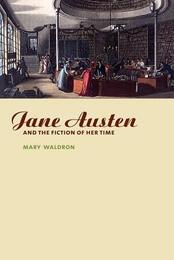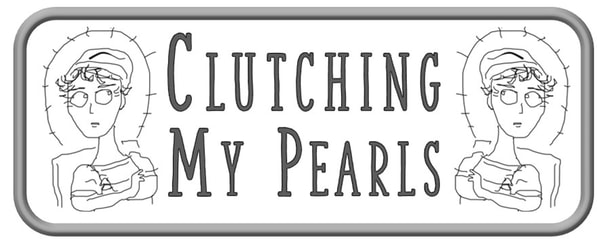| Clutching My Pearls is about Jane Austen and the times she lived in. The opinions are mine, but I don't claim originality. Much has been written about Austen. Click here for the first in the series. |

So is Fanny Price intended to be Jane Austen’s entry in the “perfect heroine” category? Is she so sweet and mild-tempered and virtuous that she's unrelatable to modern readers?
Scholar Mary Waldron says we’ve been getting Fanny – and Austen’s intentions – wrong. She says Fanny is not perfect, and is not intended to be perfect.
In Jane Austen and the Fiction of Her Time, Waldron says Austen’s contemporaries understood that Fanny wasn’t perfect, but since then, she's acquired the reputation of being a goody-goody.
Waldron suggests that instead, we look at Mansfield Park “as a working through of the unresolvable conflicts facing a young woman” who tries to follow evangelical principles. While Fanny’s actions are correct, her mind is in “turmoil.” Inwardly, she is rebelling against her fate. Waldron suggests that Austen is exploring whether it is possible to be faultless, to be perfectly modest, submissive, and charitable, and to give up the man you love without an inner murmur of the heart...

I’ll add a fault of Fanny that particularly grinds my corn: her passive-aggressive tendencies.
When Fanny is returning from an errand, she is caught in a heavy rain shower near the parsonage. The Grants see her trying "to find shelter under the branches and lingering leaves of an oak." They send “a civil servant” to invite her in from the rain. She refuses. Austen describes this as “modest reluctance.” In other words: “No, thank you. Even though your mistress specifically sent you out here to invite me in, I can’t take her at her word--I am just too unworthy. I’ll just stand here, in plain sight of your comfortable home, in the rain. Sorry you got your feet wet for nothing.”
This means Dr. Grant (who, we recall, is indolent and selfish, and will not stir a finger for the convenience of anyone) now must get his hat and umbrella and fetch her himself. “[T]here was nothing to be done but to be very much ashamed, and to get into the house as fast as possible.”
Fanny also keeps everyone waiting when Mrs. Grant invites her to dinner. We can imagine the Grants standing there, with hospitable smiles frozen on their faces, while Fanny dithers, and looks at Edmund, and dithers some more...And she also dithers and delays when Mary Crawford asks her to choose a necklace. Because nothing says “I am humble” like inconveniencing people who are more important than you.
For a deeper dive, here is my "Fanny vs Mary debate" with author Kyra Kramer, who likes Mary Crawford. Kyra says "Fanny bullied everyone with her timidity."
But I am not certain if Austen presents Fanny’s timidity as a virtue or a fault. That would be the key question here. What do you think, reader? And is it really modesty which makes Fanny dither in these three situations? Or is she avoiding being around Mary Crawford, and not wanting to like her, or be obliged to her? Waldron mentions the necklace incident and suggests it's the latter.
 "She could hardly believe it. To be placed above so many elegant young women!"
"She could hardly believe it. To be placed above so many elegant young women!" And Fanny, while very moral, has a "supine and yielding temperament." Again, is this intended to be a fault, or a virtue, or just Fanny being Fanny?
| Fanny has come to be seen as an artistic failure. The take on Fanny is that "Austen must have been trying to create a perfectly good girl and has failed." For example, C.S. Lewis calls Fanny insipid. “Jane Austen has put really nothing [into Fanny’s character] except rectitude of mind; neither passion, nor physical courage, nor wit, nor resource” to counterbalance her insignificance. (By insignificance, Lewis means that Fanny is the least important person in the household, the one nobody listens to).C.S. Lewis's brief essay "A Note on Jane Austen" is not available on the 'Net, but is well worth seeking out. If you can't read enough about Fanny Price, I've got more links at my Jane Austen page to some thoughtful stuff on the Web. I could see why Mary Crawford would be your first choice for a guest at a weekend house party, in preference to Fanny! If you think Mary deserves her own novel, try Kyra Kramer's Mansfield Parsonage. |

 RSS Feed
RSS Feed